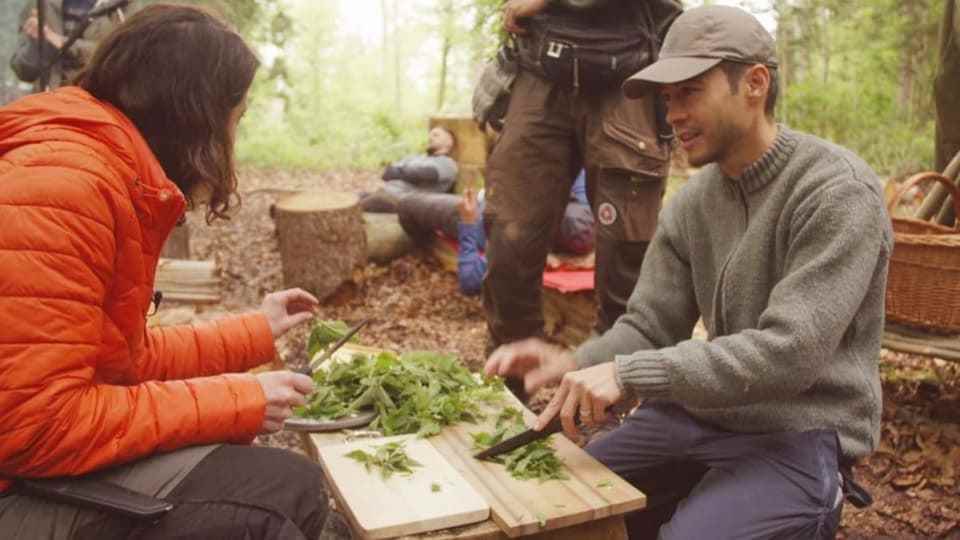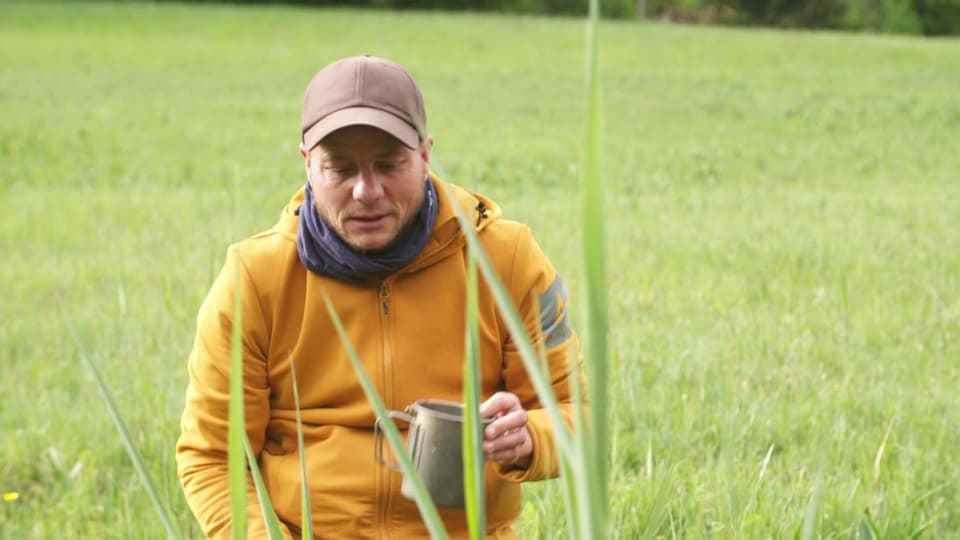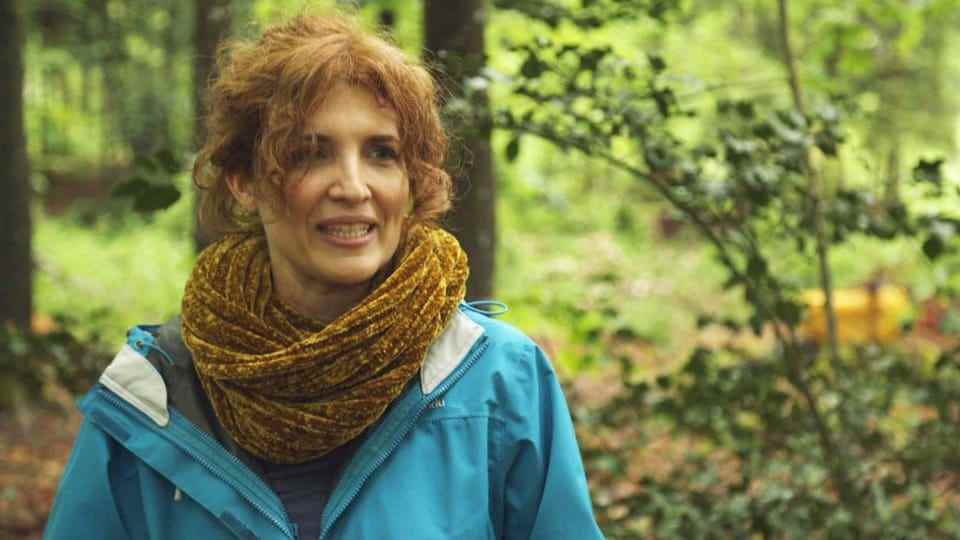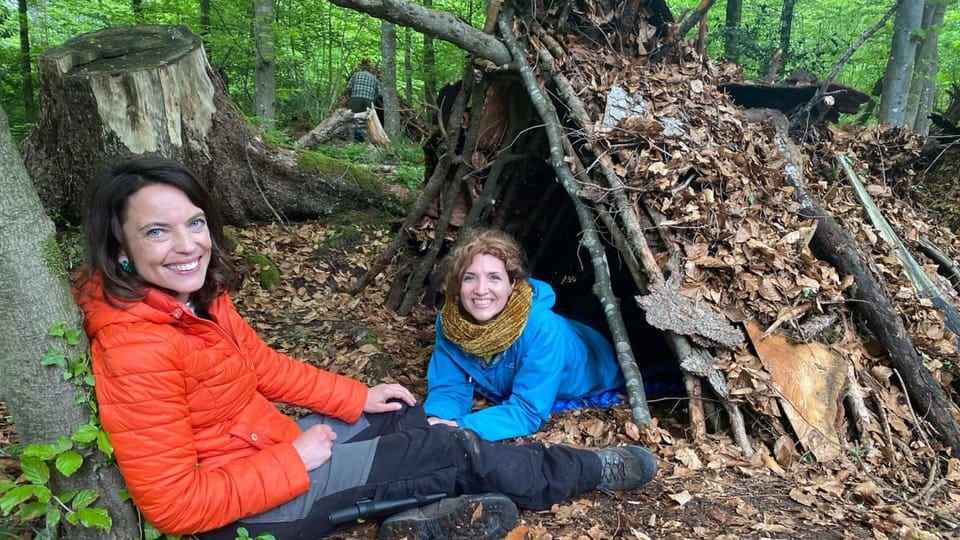Cooking soup from nettles, digging up roots and eating them, starting a fire without a match, freezing, protecting yourself from the rain, building a shelter. This is on the program of a survival training in the Zurich Oberland. Three days, two nights. Who wants that voluntarily?
«Mr. and Mrs. Swiss, Mr. and Mrs. Germany or quite simply a wide variety of people come to me. Across all professions,” says Gion Saluz, survival trainer.
The training should boom, one reads. However, there are still no national or international studies on this. Business is also going well for course instructor Gion Saluz. In the first corona lockdown, he hardly recorded any increasing numbers, but in the second the registrations increased significantly.
Legend:
Outside at home: survival trainer Gion Saluz.
SRF
The expectations of the participants are just as varied as their origins and occupations. We interviewed three of them.
warmth and food
Daniel Meier works in the pharmaceutical industry and has experienced how supply chains collapsed during the Corona period and nothing worked anymore. Then he noticed “how unstable the world is and how sensitive”. He asked himself: «What is really important in life? That’s warmth and food.” Very elementary.

Legend:
Cooking from nettles: Daniel Meier learns to feed himself in the forest.
SRF
Daniel Meier worried that he would no longer be able to take care of himself and his family. During the first corona lockdown, it was said that emergency supplies should be stocked up for a week. “First I opened the fridge, then I went to the basement. All of that would have gone nowhere.”
So Daniel Meier asked himself: «What if society collapses? When it’s no longer about whether you can pay the bills and the nice apartment, but have to ask yourself: Where’s my bowl of rice?”
Tormented by such worries, his wife gave him the survival course.
For the love of nature
For Philipp Pfister and a good friend, who often hike together, it was not the Corona crisis that was decisive, but the experience of nature. “A survival course is called that, but with us nobody has to fight for survival. This is the best way to appreciate nature. Nature offers a lot, including a lot of rest.”

Legend:
Participant Philipp Pfister looked for and found the experience of nature.
SRF
When many things were closed during the lockdown, many people would no longer have known what to do with the time. “They didn’t even notice that nature offers us a lot if we don’t destroy it,” says Philipp Pfister.
A reflection of the crisis
Fear of survival and closeness to nature are two reasons why people book survival training. Alexander Fischer also finds the wide range of participants and their motives exciting. The philosopher at the University of Basel researches, among other things, dropouts and is a therapist as well as a film and literary scholar.
“On the one hand, we have a purposeful rationality that says: It is useful to have certain skills in dealing with nature in order to be able to satisfy one’s own vital needs and survive,” he says.
Break out of the formula
In addition, there are those who do not approach it rationally, but are looking for an intensive experience of nature and feel a longing for resonance with nature. “That has become important in the times we live in today,” says Fischer. In times marked by eroding trust, war, climate and economic crises.
Fischer sees another important reason for the demand for survival training: “This should also be seen against the background of a society that works according to a thoroughly rationalized rhythm and a specific formula: do X to achieve Y – with the means Z in a certain time.” More and more people would probably want to break out of this, he analyses.
The way to yourself
Patricia Calvillo also wanted to get out of her comfort zone. She is a therapist and was looking for new experiences in dealing with nature: “The topic of self-sufficiency has interested me for a long time, this connection with nature and what it gives us.”
Calvillo had never slept in a tent before training, so he was a bit scared. When setting up the shelter before nightfall, for example, she was overwhelmed.

Legend:
Out of the comfort zone: Patricia Calvillo was initially overwhelmed in the forest, but then found inner peace.
SRF
The fact that Mona Vetsch was also shooting with her camera team for “Mona mittendrin” did not reduce her nervousness. But Calvillo stuck to her plan and wanted to try something new: “I’ll do that now. Crossing certain boundaries is good for me.”
come to rest
She slept terribly the first night, and much better the second. “The participants formed a good group,” says Patricia Calvillo. She experienced support and cohesion, which she appreciated very much.
Now, with a time lag to what she experienced, she says: “In today’s consumer-oriented society, we are increasingly alienated from nature – and also from ourselves.” Calvillo’s hope was: “If we get closer to nature, then we get closer to ourselves.”
This is exactly what she experienced. Her self-confidence has increased and an inner peace has spread.
Alienation from nature
Philosopher Alexander Fischer sees the alienation that Calvillo describes as rooted in the compulsion to grow and consume in our time. Forced because “these are all systemic forms in which we live and from which we can hardly escape”. In addition, sensory overload is another important reason. “We have increased opportunities, which can also be overwhelming. And we have a kind of massing that we’re subject to.”
What all participants describe for very different reasons: A survival training is about primary needs, about the most elementary basics of human existence compared to life in a largely saturated society with all the constraints of “always higher, always further”.
Self-optimization until sleep
How difficult it is to get rid of these constraints is shown by the reason given by some, “to want to leave the comfort zone”. Ultimately, this is not a thought that questions or even breaks the thought pattern of the meritocracy, but remains in the thought pattern of self-optimization.
Companies optimize similarly and send employees to a team event so that they learn to think “outside the box”. Will that succeed? Hardly, because office or forest makes no difference as long as the thinking remains the same.

Legend:
The shelter is built: Mona Vetsch with training participant Patricia Calvillo.
SRF
The same can be seen in the new German formulation «Power Nap». Some rush through a short sleep in order to function again. Even sleep is optimized. The constraints of “having to function” are reflected in the language.
In the endless loop of the meritocracy
Getting out starts with thinking – not with the forest. It’s ultimately about a different way of life, different values, about freedom. Nature symbolizes all of this and is therefore booming. For many years.
Those who left from the 1960s to the 1980s were smiled at and shook their heads by some. Today they are part of the mainstream. Part of pop culture’s cultivation of a longing. To put it bluntly: Anyone who left 50 years ago was a hippie or a failure. Today the rating is different. Today he asks himself the question of meaning and that of greater self-determination.
Survival as mainstream
The change is reflected in popular culture: “In the 1980s there were only a few series from the wilderness. Today there are countless reality TV series, such as the American format ‘Live Free or Die’», says Alexander Fischer. Such series are mainstream: “That’s why more and more people are paying attention to it.”
Fischer also names the phenomenon #CabinPorn on Instagram: Remote huts are photographed and publicized under the hashtag. “Images of nature are gaining more and more influence through social media.”
YouTube channels or blogs deal with nature experiences or dedicated to survival training. “This mainstreamization is a typical phenomenon of capitalism, which always manages to incorporate everything in order to then sell it as a product,” says Alexander Fischer.
Entry for dropouts
The course participants portrayed are not classic dropouts. But some, like Daniel Meier, ask the question of meaning. Several believe that civilized, highly engineered, highly capitalized time is not everything – and have an inkling of “something bigger”.
But what is this greater? “Resonance. It looks very different, »says Alexander Fischer – and names four characteristics:
- The Sensual Resonance: Some course participants describe how calm they suddenly become in nature.
- The biographical resonance normally associated with the concept of home.
- The spiritual resonance: “Nature gives me an idea that there may be something higher, something transcendent,” says Fischer.
- Finally, the aesthetic resonance – the search for beauty.
All four factors are important for a good life – and we have lost some of them. This loss is a reason to search for resonance with such a training and an existential experience. “It is logical that this cannot be fully described in our rationalized language and that we therefore need auxiliary placeholders such as ‘something bigger’ or something similar,” says Fischer.
Patricia Calvillo, the therapist, says the survival training was “another milestone.” It first got her out of her mind, then brought her closer to herself.

